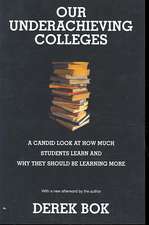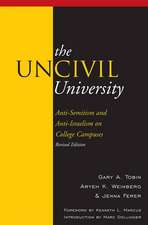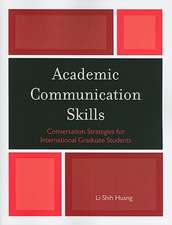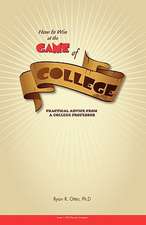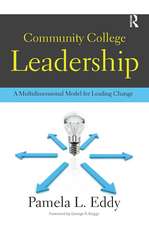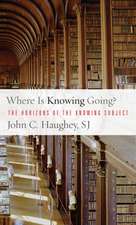Teaching as a Design Science: Building Pedagogical Patterns for Learning and Technology
Autor Diana Laurillarden Limba Engleză Hardback – 16 mar 2012
Every day, teachers design and test new ways of teaching, using learning technology to help their students. Sadly, their discoveries often remain local. By representing and communicating their best ideas as structured pedagogical patterns, teachers could develop this vital professional knowledge collectively.
Teacher professional development has not embedded in the teacher’s everyday role the idea that they could discover something worth communicating to other teachers, or build on each others’ ideas. Could the culture change?
From this unique perspective on the nature of teaching, Diana Laurillard argues that a twenty-first century education system needs teachers who work collaboratively to design effective and innovative teaching.
| Toate formatele și edițiile | Preț | Express |
|---|---|---|
| Paperback (1) | 293.00 lei 3-5 săpt. | +37.93 lei 6-12 zile |
| Taylor & Francis – 16 mar 2012 | 293.00 lei 3-5 săpt. | +37.93 lei 6-12 zile |
| Hardback (1) | 1002.99 lei 6-8 săpt. | |
| Taylor & Francis – 16 mar 2012 | 1002.99 lei 6-8 săpt. |
Preț: 1002.99 lei
Preț vechi: 1223.16 lei
-18% Nou
Puncte Express: 1504
Preț estimativ în valută:
191.93€ • 201.82$ • 158.58£
191.93€ • 201.82$ • 158.58£
Carte tipărită la comandă
Livrare economică 17 aprilie-01 mai
Preluare comenzi: 021 569.72.76
Specificații
ISBN-13: 9780415803854
ISBN-10: 0415803853
Pagini: 272
Ilustrații: 20 black & white tables
Dimensiuni: 152 x 229 x 16 mm
Greutate: 0.53 kg
Ediția:Revised edition
Editura: Taylor & Francis
Colecția Routledge
Locul publicării:Oxford, United Kingdom
ISBN-10: 0415803853
Pagini: 272
Ilustrații: 20 black & white tables
Dimensiuni: 152 x 229 x 16 mm
Greutate: 0.53 kg
Ediția:Revised edition
Editura: Taylor & Francis
Colecția Routledge
Locul publicării:Oxford, United Kingdom
Public țintă
Professional Practice & DevelopmentCuprins
Chapter 1: Teaching as a design science The role of technology Learning about teaching Education as a design science Design patterns for learning The foundations for teaching as design Chapter 2: What is formal learning? Introduction The view from the educational establishment The view from the workplace The view from educational theorists Teachers’ views of formal learning Concluding points Chapter 3: What students bring to learning Introduction Student engagement Intellectual characteristics Formal and informal learning contexts Summary Chapter 4: What it takes to learn Introduction What happens in learning Making learning happen Summary Chapter 5: What it takes to teach Introduction Factors infulencing the design of teaching Approaches to designing for learning Aligning goals, activities and assessment Monitoring alternative conceptions Scaffolding theory-generated practice Fostering conceptual change Encouraging metacognition Teaching as design A principled approach to designing for learning Summary Chapter 6: Motivating and enabling the learning cycle Introduction The under-performance of learning technologies A framework for analysing formal learning Technologies for teaching-learning activities The framework as a design analysis tool The idea of pedagogical patterns Summary Chapter 7: Learning through acquisition Introduction Learning through acquisition Teaching using narrative presentation Structuring a narrative presentation How can digital technologies help? Preparing students for learning through acquisition Capturing pedagogical patterns Summary: designing for learning through acquisition Chapter 8: Learning through inquiry Introduction Learning through inquiry Inquiry learning in the Conversational Framework How can digital technologies help? Pedagogical patterns for inquiry learning Summary: designing for learning through inquiry Chapter 9: Learning through discussion Introduction Learning through discussion Discussion-based methods How can digital technologies help? The pedagogy of learning through discussion Pedagogical patterns for discussion learning Summary: designing for learning through discussion Chapter 10: Learning through practice Introduction Learning through practice Learning through practice in formal education How can digital technologies help? Pedagogical patterns for learning through practice Summary: designing for learning through practice Chapter 11: Learning through collaboration Introduction Learning through collaboration How can digital technologies help? Pedagogical patterns for collaborative learning Summary: designing for learning through collaboration Chapter 12: Teaching as developing pedagogical Patterns Introduction Requirements for a design science Representing patterns for learning Exploring the idea of pedagogical patterns Learning design tools and resources Collaborative learning for teachers Concluding points. References
Notă biografică
Diana Laurillard is Professor of Learning with Digital Technologies at the London Knowledge Lab, Institute of Education, leading current research on developing a learning design support environment for teachers, and software for learners with low numeracy. She was previously Head of the e-Learning Strategy Unit at the Department for Education and Skills. She has also served as Pro-Vice-Chancellor for learning technologies and teaching at The Open University, and on the Visiting Committee on IT at Harvard University. She is currently on the Boards of the Observatory for Borderless HE, the UNESCO Institute for Information Technology in Education, the e-Learning Foundation, and the Council for FernUniversität in Hagen.
Recenzii
All the national and international accolades that appear in the book and on the back cover of Teaching as a Design Science are justly deserved; this is an innovative endeavor by a visionary author, Diana Laurillard. This text is rich in research studies and the use of digital technologies to enhance learning." —Teachers College Record
"The book is written for teachers at all levels, although it will probably be of primary interest to higher education faculty who have the time and resources to explore the ideas presented. It will also be valuable to educational researchers for [Laurillard’s] very thorough summary and synthesis of the literature pertaining to teaching, technology, and the design of instruction."—Educational Technology
"The book is written for teachers at all levels, although it will probably be of primary interest to higher education faculty who have the time and resources to explore the ideas presented. It will also be valuable to educational researchers for [Laurillard’s] very thorough summary and synthesis of the literature pertaining to teaching, technology, and the design of instruction."—Educational Technology
Descriere
Every day, teachers design and test new ways of teaching, using learning technology to help their learners. But their discoveries remain local. By representing and communicating their best ideas as structured pedagogical patterns, teachers could develop this vital professional knowledge collectively. From this unique perspective on the nature of teaching, Diana Laurillard argues that a 21st century education system needs teachers who work collaboratively to design effective and innovative teaching.




